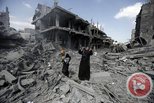9 dec 2014

The ministry of Agriculture in Gaza voiced firm rebuff to an Israeli request to meet with Palestinian farmers over the issue of toxic pesticides sprayed on their crops by Israeli warplanes last month.
The ministry had asked the Israeli occupation authorities (IOA) to identify the nature of the substance sprayed over Palestinian farmlands in mid-November near the security fence, adjacent to southern Gaza, A PIC correspondent quoted government sources as reporting.
The IOA laid down a set of stipulations, weeks after the request, saying the probe could only be carried out if samples of damaged crops are taken as case studies and Palestinian farmers are interviewed.
The Palestinian ministry rejected the appeal for fear of the security repercussions resulting from Israeli interrogation procedures.
A drove of Israeli warplanes had sprayed toxic herbicides over large areas of Palestinians’ crops and farmlands, for three days, that penetrated as deep as 1500 meters of the targeted lands located west of the border fence separating Gaza and 1948 Occupied Palestine.
More than 600 dunums of Palestinian cultivated land lots have sustained considerable damage in the process.
The ministry had asked the Israeli occupation authorities (IOA) to identify the nature of the substance sprayed over Palestinian farmlands in mid-November near the security fence, adjacent to southern Gaza, A PIC correspondent quoted government sources as reporting.
The IOA laid down a set of stipulations, weeks after the request, saying the probe could only be carried out if samples of damaged crops are taken as case studies and Palestinian farmers are interviewed.
The Palestinian ministry rejected the appeal for fear of the security repercussions resulting from Israeli interrogation procedures.
A drove of Israeli warplanes had sprayed toxic herbicides over large areas of Palestinians’ crops and farmlands, for three days, that penetrated as deep as 1500 meters of the targeted lands located west of the border fence separating Gaza and 1948 Occupied Palestine.
More than 600 dunums of Palestinian cultivated land lots have sustained considerable damage in the process.
responsible should be brought to justice in fair trials."
Evidence including statements by the Israeli military at the time indicate the attacks were "a collective punishment against the people of Gaza" designed to destroy their livelihoods, Luther added.
There was no immediate reaction to the Amnesty statement from Israeli authorities.
However, Israel has refused to cooperate with a UN inquiry into possible war crimes during the conflict, accusing it of bias.
The Israeli army has launched a series of criminal investigations into incidents in the war, including the shelling of a UN school that medics said killed at least 15 people and the bombing of a beach where four children died.
Critics, however, have said that the investigations by Israel will not be independent.
More than 2,100 Palestinians, most of them civilians, were killed in the war between Israel and Hamas-led militants, which ended on August 26. On the Israeli side 73 people were killed, 67 of them soldiers.
Militant facilities
One of the landmark buildings destroyed was the Municipal Commercial Center in Rafah, which contained a shopping mall, a medical clinic and offices, and provided livelihoods for hundreds of families, the Amnesty International report said.
Residents of the buildings about to be destroyed were warned to leave by the Israeli military, but that they did not have time to salvage important belongings, it added.
Scores of people from nearby buildings were injured, and hundreds lost their homes, according to the rights group.
Israeli authorities had said that one building housed a command center of the Palestinian Islamist movement Hamas, and that another had "facilities linked to Palestinian militants," according to the report.
However, Luther said the military still "had an obligation to choose means and methods of attack that would minimize harm to civilians and their property."
"The Israeli army have previously conducted air strikes on specific apartments in high-rise buildings without their complete destruction," he added.
The rights group said it had sent its findings about the airstrikes to Israeli authorities with questions about why each attack was carried out, but had not received an adequate response.
The report called for Amnesty International and other rights groups to be allowed access to Gaza and for the UN inquiry to be allowed "to conduct its investigation without hindrance."
New Amnesty International Report: Israel 'deliberately and wantonly' targeted residential towers
Evidence including statements by the Israeli military at the time indicate the attacks were "a collective punishment against the people of Gaza" designed to destroy their livelihoods, Luther added.
There was no immediate reaction to the Amnesty statement from Israeli authorities.
However, Israel has refused to cooperate with a UN inquiry into possible war crimes during the conflict, accusing it of bias.
The Israeli army has launched a series of criminal investigations into incidents in the war, including the shelling of a UN school that medics said killed at least 15 people and the bombing of a beach where four children died.
Critics, however, have said that the investigations by Israel will not be independent.
More than 2,100 Palestinians, most of them civilians, were killed in the war between Israel and Hamas-led militants, which ended on August 26. On the Israeli side 73 people were killed, 67 of them soldiers.
Militant facilities
One of the landmark buildings destroyed was the Municipal Commercial Center in Rafah, which contained a shopping mall, a medical clinic and offices, and provided livelihoods for hundreds of families, the Amnesty International report said.
Residents of the buildings about to be destroyed were warned to leave by the Israeli military, but that they did not have time to salvage important belongings, it added.
Scores of people from nearby buildings were injured, and hundreds lost their homes, according to the rights group.
Israeli authorities had said that one building housed a command center of the Palestinian Islamist movement Hamas, and that another had "facilities linked to Palestinian militants," according to the report.
However, Luther said the military still "had an obligation to choose means and methods of attack that would minimize harm to civilians and their property."
"The Israeli army have previously conducted air strikes on specific apartments in high-rise buildings without their complete destruction," he added.
The rights group said it had sent its findings about the airstrikes to Israeli authorities with questions about why each attack was carried out, but had not received an adequate response.
The report called for Amnesty International and other rights groups to be allowed access to Gaza and for the UN inquiry to be allowed "to conduct its investigation without hindrance."
New Amnesty International Report: Israel 'deliberately and wantonly' targeted residential towers
8 dec 2014

Hamas spokesman Fawzi Barhoum said that the Israeli government's intention to form internal committees to probe its military crimes in the Gaza Strip is an attempt to prevent any chance for an international fact-finding committees to find the truth.
Barhoum made his press remarks in response to Israeli military advocate general Danny Efroni's announcement of launching an investigation into killing incidents during the last war on the Gaza Strip.
"Hamas does not trust any Israeli investigation results in which the truth will be twisted, and it would be unreasonable and unacceptable to make the criminal the referee and judge at the same time," the spokesman said.
The spokesman added that previous Israeli probe committees acquitted the perpetrators of crimes against the Palestinians and criminalized the victims.
"Therefore, there is need for allowing impartial and transparent international legal committees to find out about the occupation's crimes against the Palestinians as a prelude to taking legal action in international and local courts," he stressed.
The Israeli occupation army announced recently that its advocate general had opened new criminal investigations into eight killing incidents that happened during the last war on Gaza in July 2014.
Barhoum made his press remarks in response to Israeli military advocate general Danny Efroni's announcement of launching an investigation into killing incidents during the last war on the Gaza Strip.
"Hamas does not trust any Israeli investigation results in which the truth will be twisted, and it would be unreasonable and unacceptable to make the criminal the referee and judge at the same time," the spokesman said.
The spokesman added that previous Israeli probe committees acquitted the perpetrators of crimes against the Palestinians and criminalized the victims.
"Therefore, there is need for allowing impartial and transparent international legal committees to find out about the occupation's crimes against the Palestinians as a prelude to taking legal action in international and local courts," he stressed.
The Israeli occupation army announced recently that its advocate general had opened new criminal investigations into eight killing incidents that happened during the last war on Gaza in July 2014.
4 dec 2014

The commission of inquiry on the Gaza conflict, appointed by the UN Human Rights Council to probe into the latest Israeli offensive on Gaza, arrived in the Strip Wednesday.
Head of the Department of Gaza’s Border Crossings, Maher Abu Sabha, said the team of investigators reached Gaza Wednesday via the Beit Hanoun crossing.
The UN delegation is expected to pop by the neighborhoods and UNRWA schools destroyed by Israeli attacks.
Earlier, the Israeli occupation authorities banned the investigation team from entering the Strip allegedly due to what it dubbed a biased position adopted by head of the delegation William Schabas.
Observers dubbed the ban a manifestation of Israeli intents to “cover up its crimes” perpetrated against innocent civilians.
The committee was appointed on July 23 to probe and detect potential violations of international humanitarian laws during Israel’s 51-day offensive on the blockaded enclave.
A preliminary report is expected to be released by the committee by the month of March.
At least 2000 Palestinians were killed while some 11000 others were wounded in the notorious Israeli offensive on the Gaza Strip launched on July 7.
Head of the Department of Gaza’s Border Crossings, Maher Abu Sabha, said the team of investigators reached Gaza Wednesday via the Beit Hanoun crossing.
The UN delegation is expected to pop by the neighborhoods and UNRWA schools destroyed by Israeli attacks.
Earlier, the Israeli occupation authorities banned the investigation team from entering the Strip allegedly due to what it dubbed a biased position adopted by head of the delegation William Schabas.
Observers dubbed the ban a manifestation of Israeli intents to “cover up its crimes” perpetrated against innocent civilians.
The committee was appointed on July 23 to probe and detect potential violations of international humanitarian laws during Israel’s 51-day offensive on the blockaded enclave.
A preliminary report is expected to be released by the committee by the month of March.
At least 2000 Palestinians were killed while some 11000 others were wounded in the notorious Israeli offensive on the Gaza Strip launched on July 7.

A number of academics, lawyers and politicians have asserted the claim that the international committee to investigate Israeli war crimes in Gaza must be based in Jordan, stressing that they will not underestimate the legal value of any issued decision.
According to Al Ray Palestinian Media Agency, in a seminar organized by the Council of International Relations, Monday, at Al Marana hotel in Gaza, attendants stressed the necessity of supporting the presence of the committee to Gaza by recruiting all relevant political parties, including the Palestinian Authority, to file an objection at the Human Rights Council which rejects the plan of conducting investigations from Jordan.
British lawyer and counsel to the queen, Toby M. Cadman, said via Skype that Israel has insisted on evading its responsibility in crimes committed on Gaza, pointing out that in a similar attack on Gaza, in 2008, Israel had refused to deal with the investigations committee.
He also assured that this decision is not up to the state, whereas the decision of forming the committee is a UN resolution, further pointing out that there is a sort of positivity in opening the issue, despite the Israeli ban.
Meanwhile, he denounced the United Nations and International communities on the Israeli rejection, making clear that the step to ensure justice and accountability is to sign and ratify the Rome Statute, thereafter making an immediate request that an investigation has commenced.
Mr. Cadman called for the urgent need to continue the investigation: " ...this rejection is considered to be as a stab in the way of reaching the backbone of truth, evidence and documents..." and, in doing so, called the Palestinian National Authority to head to the International Criminal court to bring Israel to justice.
Furthermore, on his part, Head of Arab Lawyers Association in Britain, Sabbah Mukhtar, said that "the simplest rules of investigation is to preserve the crime scene and not to change any of the facts. Also, the investigator should have an access to the crime scene to get evidences, date and witnesses."
He added in his own intervention, via Skype, that the Israeli ban to the committee "is a clear attack on applying law; Israel had attacked the Canadian investigation lawyer, who heads the committee and accused him of not being neutral, though collecting evidences is only an investigative procedure, not a judgment..."
He continued: "Despite Goldstone's [PDF] statement that he is a Jewish and a Zionist, Israel tired to prevent him from conducting any investigations at that time, accusing him of not being loyal and working against it. This shows that the problem is not in the investigating judges, but in the Israeli policy to block access to the facts and pursuit to absenting the justice, and cover up its crimes."
Mr. Mukhtar has also assured that conducting the investigation from Amman is improper according the technical and legal standards: "The investigation cannot be done away of the crime scene. Also, it is practically cannot move dozens of people to Jordan to investigate with them or take their statements."
He also denounced the approval by the Canadian head of the committee to investigate from Amman, saying: "This investigation would be incomplete significantly and cannot be considered as an investigation."
He additionally denounced the official Arab position, including that of the Palestinian Authority, saying that the investigation must be representative of the people and the Palestinian cause, and should take a tough stance as a rightful owner.
At the same time, denouncing the Egyptian restrictions on the besieged Gaza Strip, he stressed that the states have to shoulder the responsibility of humanitarian tragedies towards the neighboring countries which Egypt inversely operates.
According to Al Ray Palestinian Media Agency, in a seminar organized by the Council of International Relations, Monday, at Al Marana hotel in Gaza, attendants stressed the necessity of supporting the presence of the committee to Gaza by recruiting all relevant political parties, including the Palestinian Authority, to file an objection at the Human Rights Council which rejects the plan of conducting investigations from Jordan.
British lawyer and counsel to the queen, Toby M. Cadman, said via Skype that Israel has insisted on evading its responsibility in crimes committed on Gaza, pointing out that in a similar attack on Gaza, in 2008, Israel had refused to deal with the investigations committee.
He also assured that this decision is not up to the state, whereas the decision of forming the committee is a UN resolution, further pointing out that there is a sort of positivity in opening the issue, despite the Israeli ban.
Meanwhile, he denounced the United Nations and International communities on the Israeli rejection, making clear that the step to ensure justice and accountability is to sign and ratify the Rome Statute, thereafter making an immediate request that an investigation has commenced.
Mr. Cadman called for the urgent need to continue the investigation: " ...this rejection is considered to be as a stab in the way of reaching the backbone of truth, evidence and documents..." and, in doing so, called the Palestinian National Authority to head to the International Criminal court to bring Israel to justice.
Furthermore, on his part, Head of Arab Lawyers Association in Britain, Sabbah Mukhtar, said that "the simplest rules of investigation is to preserve the crime scene and not to change any of the facts. Also, the investigator should have an access to the crime scene to get evidences, date and witnesses."
He added in his own intervention, via Skype, that the Israeli ban to the committee "is a clear attack on applying law; Israel had attacked the Canadian investigation lawyer, who heads the committee and accused him of not being neutral, though collecting evidences is only an investigative procedure, not a judgment..."
He continued: "Despite Goldstone's [PDF] statement that he is a Jewish and a Zionist, Israel tired to prevent him from conducting any investigations at that time, accusing him of not being loyal and working against it. This shows that the problem is not in the investigating judges, but in the Israeli policy to block access to the facts and pursuit to absenting the justice, and cover up its crimes."
Mr. Mukhtar has also assured that conducting the investigation from Amman is improper according the technical and legal standards: "The investigation cannot be done away of the crime scene. Also, it is practically cannot move dozens of people to Jordan to investigate with them or take their statements."
He also denounced the approval by the Canadian head of the committee to investigate from Amman, saying: "This investigation would be incomplete significantly and cannot be considered as an investigation."
He additionally denounced the official Arab position, including that of the Palestinian Authority, saying that the investigation must be representative of the people and the Palestinian cause, and should take a tough stance as a rightful owner.
At the same time, denouncing the Egyptian restrictions on the besieged Gaza Strip, he stressed that the states have to shoulder the responsibility of humanitarian tragedies towards the neighboring countries which Egypt inversely operates.
1 dec 2014
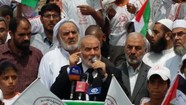
The Palestinian Legislative Council (PLC) returned Sunday to Gaza Strip via Rafah crossing after concluding its foreign tour.
The delegation, headed by the PLC deputy speaker Dr. Ahmed Bahar, had visited Saudi Arabia, Qatar and Turkey.
In a brief statement, Dr. Bahar condemned Israeli occupation authorities’ decision to bar a European delegation’s entry to Gaza Strip.
A delegation from the sub-committee on the Middle East of the parliamentary assembly of the council of Europe, which arrived on Friday in Ramallah city, was supposed to visit Gaza on Saturday morning, in order to visit the areas destroyed in the latest Israeli offensive and meet with impoverished and displaced families but the IOA denied its access to the besieged enclave.
Dr. Bahar confirmed that barring the European delegation’s entry to the Strip aims to cover up Israel’s crimes and human rights violations carried out during its 51-day aggression on Gaza.
The PLC deputy speaker called on international delegations and missions to challenge Israeli pressures and to intensify visits to the besieged Strip of Gaza in order to expose Israel’s crimes against humanity.
He stressed the need to stand against Israel’s continued violations of international laws and conventions and its collective punishment policy against 1.8 million people living in Gaza Strip.
Dr. Bahar also pointed to the poor humanitarian conditions suffered in Gaza Strip that deepened after the Israeli summer offensive.
The delegation, headed by the PLC deputy speaker Dr. Ahmed Bahar, had visited Saudi Arabia, Qatar and Turkey.
In a brief statement, Dr. Bahar condemned Israeli occupation authorities’ decision to bar a European delegation’s entry to Gaza Strip.
A delegation from the sub-committee on the Middle East of the parliamentary assembly of the council of Europe, which arrived on Friday in Ramallah city, was supposed to visit Gaza on Saturday morning, in order to visit the areas destroyed in the latest Israeli offensive and meet with impoverished and displaced families but the IOA denied its access to the besieged enclave.
Dr. Bahar confirmed that barring the European delegation’s entry to the Strip aims to cover up Israel’s crimes and human rights violations carried out during its 51-day aggression on Gaza.
The PLC deputy speaker called on international delegations and missions to challenge Israeli pressures and to intensify visits to the besieged Strip of Gaza in order to expose Israel’s crimes against humanity.
He stressed the need to stand against Israel’s continued violations of international laws and conventions and its collective punishment policy against 1.8 million people living in Gaza Strip.
Dr. Bahar also pointed to the poor humanitarian conditions suffered in Gaza Strip that deepened after the Israeli summer offensive.
30 nov 2014
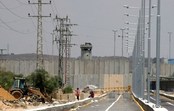
The Israeli occupation authority prevented a European delegation from visiting the war-battered Gaza Strip in order to visit the affected areas and meet with impoverished and displaced families.
A delegation from the sub-committee on the Middle East of the parliamentary assembly of the council of Europe, which arrived on Friday in Ramallah city, was supposed to visit Gaza on Saturday morning, but the IOA denied it entry to the besieged enclave.
The Palestinian legislative council (PLC) had organized on Friday evening a reception in honor of the European delegation.
Consequently, the mission of the delegation will be confined to meetings with officials in Ramallah.
The delegates' meetings are scheduled with the Palestinian premier, the minister of the economy, members of the Palestinian Legislative Council (PLC), the chief negotiator for the peace talks with Israel, the negotiator for the Palestinian reconciliation, and representatives from the private sector.
The delegation will be gathering information for the preparation of its report on the situation in the occupied Palestinian territories.
A delegation from the sub-committee on the Middle East of the parliamentary assembly of the council of Europe, which arrived on Friday in Ramallah city, was supposed to visit Gaza on Saturday morning, but the IOA denied it entry to the besieged enclave.
The Palestinian legislative council (PLC) had organized on Friday evening a reception in honor of the European delegation.
Consequently, the mission of the delegation will be confined to meetings with officials in Ramallah.
The delegates' meetings are scheduled with the Palestinian premier, the minister of the economy, members of the Palestinian Legislative Council (PLC), the chief negotiator for the peace talks with Israel, the negotiator for the Palestinian reconciliation, and representatives from the private sector.
The delegation will be gathering information for the preparation of its report on the situation in the occupied Palestinian territories.
21 nov 2014
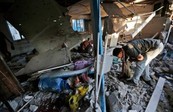
After refusing to cooperate with a one UN committee, Jerusalem has reportedly agreed to work with another, so long as certain conditions are met.
According to the PNN, Israeli newspaper Haaretz said, Thursday, that Israel has agreed to cooperate with the UN Headquarters Board of Inquiry, established by Secretary-General Ban Ki-moon, in order to investigate the damage done to UNRWA facilities during the assault on the Gaza, this past summer.
A senior Foreign Ministry official stated that Israel's ambassador to the United Nations, Ron Prosor, had submitted a letter on the issue to Ki-moon on Tuesday. The official added that Israel had set conditions for cooperation, but declined to elaborate.
Last week, Ban announced the formation of an "internal and independent" board which would probe the damage inflicted on UN installations. He said that the board would also investigate cases in which weapons were found at UN facilities.
The board "will review and investigate a number of specific incidents in which death or injuries occurred at, and/or damage was done to United Nations premises," the UN stated. "The Board will also review and investigate incidents in which weapons were found to be present on United Nations premises. The Secretary-General expects that the Board will enjoy the full cooperation of all parties concerned."
A similar UN headquarters board of inquiry investigated the Gaza conflict over the winter of 2008-09. In this case, Israel cooperated with the investigation, and the board harshly criticized Israel for certain actions during the war.
Israel's disappointment with the results of that inquiry is presumably the reason it has set conditions for the current inquiry.
An investigative board established by the UN Secretary-General is viewed as much more reliable and serious than investigative committees established by bodies such as the UN Human Rights Council, which has also set up a committee to investigate alleged Israeli war crimes during 2014's "Operation Protective Edge".
Last week, Israel announced that it would not be cooperating with the UNHCR investigation headed by Canadian jurist William Schabas, reasoning that it was "tendentious and one-sided."
According to the PNN, Israeli newspaper Haaretz said, Thursday, that Israel has agreed to cooperate with the UN Headquarters Board of Inquiry, established by Secretary-General Ban Ki-moon, in order to investigate the damage done to UNRWA facilities during the assault on the Gaza, this past summer.
A senior Foreign Ministry official stated that Israel's ambassador to the United Nations, Ron Prosor, had submitted a letter on the issue to Ki-moon on Tuesday. The official added that Israel had set conditions for cooperation, but declined to elaborate.
Last week, Ban announced the formation of an "internal and independent" board which would probe the damage inflicted on UN installations. He said that the board would also investigate cases in which weapons were found at UN facilities.
The board "will review and investigate a number of specific incidents in which death or injuries occurred at, and/or damage was done to United Nations premises," the UN stated. "The Board will also review and investigate incidents in which weapons were found to be present on United Nations premises. The Secretary-General expects that the Board will enjoy the full cooperation of all parties concerned."
A similar UN headquarters board of inquiry investigated the Gaza conflict over the winter of 2008-09. In this case, Israel cooperated with the investigation, and the board harshly criticized Israel for certain actions during the war.
Israel's disappointment with the results of that inquiry is presumably the reason it has set conditions for the current inquiry.
An investigative board established by the UN Secretary-General is viewed as much more reliable and serious than investigative committees established by bodies such as the UN Human Rights Council, which has also set up a committee to investigate alleged Israeli war crimes during 2014's "Operation Protective Edge".
Last week, Israel announced that it would not be cooperating with the UNHCR investigation headed by Canadian jurist William Schabas, reasoning that it was "tendentious and one-sided."
18 nov 2014
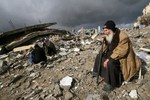
The Hamas Movement denounced Israel for denying entry into Gaza for
members of the UN human rights council commission charged with
investigating war crimes committed during Israel's last war on the Gaza
Strip.
The Movement's spokesman Sami Abu Zuhri described in a statement on Monday that such an Israeli step was aimed at covering up its war crimes in Gaza.
Abu Zuhri urged the UN probe commission to uphold its right to enter Gaza and make field visits to the bombed areas.
The spokesman warned the commission of any intention to open investigation into Israeli crimes outside Gaza, saying that such a step would prevent it visiting the crime scenes to see the size of destruction and listen to testimonies from eyewitnesses and survivors.
He called on the Palestinian Authority to move diplomatically to pressure Israel into allowing the UN probe commission to work with no restrictions
http://english.palinfo
The Movement's spokesman Sami Abu Zuhri described in a statement on Monday that such an Israeli step was aimed at covering up its war crimes in Gaza.
Abu Zuhri urged the UN probe commission to uphold its right to enter Gaza and make field visits to the bombed areas.
The spokesman warned the commission of any intention to open investigation into Israeli crimes outside Gaza, saying that such a step would prevent it visiting the crime scenes to see the size of destruction and listen to testimonies from eyewitnesses and survivors.
He called on the Palestinian Authority to move diplomatically to pressure Israel into allowing the UN probe commission to work with no restrictions
http://english.palinfo
